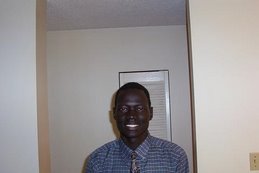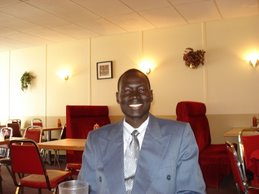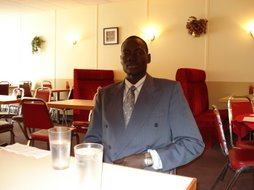Tuesday, June 1, 2010
Warm Welcome
I am back on blogging and I am welcoming back visitors to this blog. It has been long time since I last logged on to this site. Now, I am back. Also, I am at a different location. That is to say I am in South Sudan and what I may post on here will assist those who are not in South Sudan to picture how things are in the region. Mostly, I will be noting on developmental issues in Sudan. Anyways, I would like to stop and I will be updating this site regulary.
Monday, October 22, 2007
Joining the Race Against CPA, SPLM and Marginalised Areas of Sudan is a discredit for you Ali Osman Mohammed Taha, and it won’t help NCP finds way out
| October 22nd 2007 - For reasons such as being one of the men who brokered the Comprehensive Peace Agreement (CPA), Ali Osman Mohammed Taha has been supportive of the CPA and its implementation, which brought difference between him and some extremists in National Congress Party circle, and even at some points with the long time friend and cousin NCP chairman and the president Omar Hassen el Bashir. Mr. Taha on behalf of NCP negotiated CPA with late Dr. John Garang De Mabior of the SPLM who was then the SPLM chairman and commander-in-chief of Sudan People's Liberation Army ( SPLA), the military wing of the SPLM which waged war against Islamic regime in Sudan till 2005 when the peace accord between warring parties ended Africa’s longest and bloodiest civil war. Since he concluded the peace agreement with the SPLM, Ali Osman Mohammed Taha earned credit internationally. In Sudan, he was seen as a statesman and charismatic leader who is sincere and possesses conflict resolution abilities, at least to majority of Sudanese particularly marginalised people. To radical islamists within NCP circle, Taha’s success was viewed differently and contrary to ordinary Sudanese citizens’ views. The group of bigotry, power thirst and radicals in the ruling northern regime alleged that CPA which Ali signed has given away tremendous amount of powers to the SPLM and other Sudanese political parties which created power vacuum in the NCP. This group was determined to work within the NCP to disintegrate the agreement. This prompted Mohammed Taha to be concerned with implementation of the agreement he signed and is credit for. After successfully concluding the peace agreement, and given that there were some forces within NCP who were against the CPA, Taha’s next concern was the implementation of the accord. Before the CPA, the NCP was hundred percent in control of government seats. This also means that hardliner ones were always in prestigious positions. Now with the CPA in hands, that status quo was to change. As agreed upon in the comprehensive peace agreement, NCP was allocated 52%, SPLM with 28% and other Sudanese political forces with the remaining 20% of the government seats. In this context, the NCP power decreased from 100% to 52%, and that means there were more NCP power thirsts than power they can have. This allocation of government powers also means that there were less prestigious positions for NCP than it used to be. To Ali Osman Mohammed Taha who was concerned with some NCP members’ opposition to CPA, it even meant that there were more choices to choose from as to who should take prestigious positions within the NCP. During the formation of the government of national unity (GONU), Ali proposed appointment of new NCP figures to privilege ministries instead of old faces. His attempt was to eliminate thugs who had been revolving the circle of NCP high-status positions, and who were at the same time alarmed at changes brought about by the CPA which they blamed on Mohammed Taha. Unfortunately, Ali Osman’s attempt failed due to group’s closeness to El Bashir. The group has long supported and guarded Omar El Bashir’s cynical government, therefore, they earned credibility of El Bashir, and any attempt to rid them is seen as a creation of power vacuum which is unacceptable to Omar. As a result, Omar Bashir null the only way Taha thought he could get the CPA implemented and change the status quo of the national congress party. The difference over CPA implementation and other liberal positions Taha have taken such as vying for the transfer of the African Union force in Darfur over to robust UN force intensified tension between Bashir and Taha which prompted Taha to temporary flee the country for Turkey in the mirage that he was going for holidays. This happened at around Omar El Bashir’s 17th coup anniversary, the June 30th 1989 coup which brought him to power. Taha overstayed his holiday in exile in Turkey amid difference between him and El Bashir. The news of simmering feud between the two top NCP leaders caused anguish nationally and internationally. Fearing that other Sudanese political forces would take advantage of the crisis in NCP, El Bashir convinced Mr. Taha to rejoin him. Although Ali Osman Mohammed Taha failed to change the status quo of Omar El Bashir’s NCP, he had credibility and admiration of the majority of Sudanese till he recently joined the radical group within the NCP and the race against CPA, SPLM and Marginalised Areas of the Sudan. As political crises continue between SPLM and NCP due to SPLM’S suspension of its ministers from the government of national (GONU) owing to NCP’s violation of CPA and lack of political will to implement the CPA, Ali Osman Mohammed Taha, the only NCP member who was believed to be sincere finally joined the radical islamists and falsely accused the SPLM of preparing for war. This latest development is a big blow to the agreement that he spent two years negotiating and which earned him credibility. It is a political suicide which neither earned him nor NCP any credits, but discredited him and will intensify tension between the two parties. The marginalised Sudanese people who believed you were open minded and honest lost that belief as they read in the news, watched and listened to you spreading baseless allegations about the SPLA troops massing up at borders preparing for war. It has put you inline with dishonest Omar El Bashir who always makes inciting statements and later retracts them. You joining the Race Against CPA, SPLM and Marginalised Areas of Sudan is a discredit for you, and it won’t help NCP finds way out of its current political crises with the SPLM. In fact, this false accusations tell marginalised Sudanese and the party you are accusing that what you and NCP are doing is an inverse of what you alleged, and it is worsening the feud. You as the think tank of NCP and pragmatic as it was believed should have better ways of resolving this quandary, but you took the wrong step and direction. Please take Steps back, rethink and come up with amicable way of exiting this crisis instead of pushing it from bad to worse. This is in the best interests of all Sudanese people and particularly you big NCP guys. Forging good partnership with the SPLM now, is the last chance for NCP’s political future. |
Thursday, September 27, 2007
A response to an article about mistreatment of Ugandans in South Sudan: http://www.sudantribune.com/spip.php?article23977
Follow the link below to the article. http://www.sudantribune.com/spip.php?article23977
Thank you Mr. Lago, you have pointed out a very impportant point. Ugandans have always been our brothers and sisters, and always be. It would be very selfish of us, Southern Sudanese to pay back the hospitality and generosity Ugandans accorded us with during our struggles, with unwelcoming, mistreatment, and mischevious acts against Ugandans in our Territory. We still have a long way to go, of which we might need generous support from Uganda as we did during our years of struggles. And needless to say is that, even if we feel we have accomplished our goals, we still have to look back to how we achieved those goals, how to sustain and flourish them. And we should also know that we won't be well off without good relationship with Uganda. We have commodity of all sorts that we need the market for. All in all, we need Ugandans and Ugandans need us. And they have shown us that they need us. They have supported and accommodated us during the wars and even now, after the war. They came in to help us develop our country. All different and important services they bring to us won't be easy to produce in South without their help. Therefore, they should be praised and encouraged to render their services to their brothers and sisters without fear instead of harrassing them. I urge every Southern Sudanese who is proud of South Sudan to be mindful of the support Uganda has given us since the beginning of Southern struggles, and also be mindful of the consequences of their acts on fellow South Sudanese abroad like in Uganda. In additon, let us give the rule of law a chance to take its course in South Sudan. Let us see and solve problems with the eyes of laws, whether the problem is between South Sudanese or South Sudanese and a citzen of another counrty. This is for our good and our country. Thank you Mr. Lago for your consciousness on this very important issue.
Thank you Mr. Lago, you have pointed out a very impportant point. Ugandans have always been our brothers and sisters, and always be. It would be very selfish of us, Southern Sudanese to pay back the hospitality and generosity Ugandans accorded us with during our struggles, with unwelcoming, mistreatment, and mischevious acts against Ugandans in our Territory. We still have a long way to go, of which we might need generous support from Uganda as we did during our years of struggles. And needless to say is that, even if we feel we have accomplished our goals, we still have to look back to how we achieved those goals, how to sustain and flourish them. And we should also know that we won't be well off without good relationship with Uganda. We have commodity of all sorts that we need the market for. All in all, we need Ugandans and Ugandans need us. And they have shown us that they need us. They have supported and accommodated us during the wars and even now, after the war. They came in to help us develop our country. All different and important services they bring to us won't be easy to produce in South without their help. Therefore, they should be praised and encouraged to render their services to their brothers and sisters without fear instead of harrassing them. I urge every Southern Sudanese who is proud of South Sudan to be mindful of the support Uganda has given us since the beginning of Southern struggles, and also be mindful of the consequences of their acts on fellow South Sudanese abroad like in Uganda. In additon, let us give the rule of law a chance to take its course in South Sudan. Let us see and solve problems with the eyes of laws, whether the problem is between South Sudanese or South Sudanese and a citzen of another counrty. This is for our good and our country. Thank you Mr. Lago for your consciousness on this very important issue.
Ugandan lawmakers request South Sudan apology
September 27, 2007 (KAMPALA) — To show their angry over the mistreatment of their nationals in southern Sudan, the Ugandan lawmakers asked southern Sudan government to apologize about the crowing attacks against the Ugandans, the Daily Monitor reported.
Ugandan legislators have protested against the mistreatment of Ugandans living and working in South Sudan. The bitter MPs also asked the Government of South Sudan (GoSS) to apologise to Ugandans about the increasing harassment by their people and to ensure such treatment does not occur again.
The MPs who were contributing to a report by State Minister for Regional Cooperation Isaac Musumba on the situation of Ugandans in South Sudan, on Tuesday said the Sudanese are treated well in Uganda, which is not the case for Ugandans there.
Opposition Shadow Minister for Foreign Affairs Reagan Okumu (Aswa) said, "At least we deserve an apology. The Sudanese own properties here and send their children to our schools but we do not harass them. We demand compensation for the victims."
On September 5, the vice chairman of the Ugandan business community in Juba, Anthony Makuyi, was stabbed to death by a GoSS soldier at a market in Juba. Lubaga South MP Susan Nampijja said she has a list of Ugandan women who were raped by the Sudanese. Mr Musumba said the government would engage GoSS to find solutions.
In a report to the parliament on Tuesday the state minister for regional affairs, Isaac Musumba, has disclosed that the government will send a delegation to Juba to probe reports of harassment of Ugandan traders.
He further said that the delegation would identify and address non-tariff barriers experienced by the businessmen. It will also hold discussions with the Government of South Sudan to resolve other complaints.
South Sudan government president Salva Kiir Mayadrit urged Southern Sudanese to refrains from taking revenge on nationals of neighboring countries who have supported SPLM/A during their difficult time of liberation struggle.
However, president Kiir disputed allegation that 20 Uganda citizens were killed in southern Sudan in the course of two years.
(ST)
Ugandan legislators have protested against the mistreatment of Ugandans living and working in South Sudan. The bitter MPs also asked the Government of South Sudan (GoSS) to apologise to Ugandans about the increasing harassment by their people and to ensure such treatment does not occur again.
The MPs who were contributing to a report by State Minister for Regional Cooperation Isaac Musumba on the situation of Ugandans in South Sudan, on Tuesday said the Sudanese are treated well in Uganda, which is not the case for Ugandans there.
Opposition Shadow Minister for Foreign Affairs Reagan Okumu (Aswa) said, "At least we deserve an apology. The Sudanese own properties here and send their children to our schools but we do not harass them. We demand compensation for the victims."
On September 5, the vice chairman of the Ugandan business community in Juba, Anthony Makuyi, was stabbed to death by a GoSS soldier at a market in Juba. Lubaga South MP Susan Nampijja said she has a list of Ugandan women who were raped by the Sudanese. Mr Musumba said the government would engage GoSS to find solutions.
In a report to the parliament on Tuesday the state minister for regional affairs, Isaac Musumba, has disclosed that the government will send a delegation to Juba to probe reports of harassment of Ugandan traders.
He further said that the delegation would identify and address non-tariff barriers experienced by the businessmen. It will also hold discussions with the Government of South Sudan to resolve other complaints.
South Sudan government president Salva Kiir Mayadrit urged Southern Sudanese to refrains from taking revenge on nationals of neighboring countries who have supported SPLM/A during their difficult time of liberation struggle.
However, president Kiir disputed allegation that 20 Uganda citizens were killed in southern Sudan in the course of two years.
(ST)
Monday, June 18, 2007
Raising Awareness
Here on this blog, I intent to raise awareness and consciousness of Liberty, Equality and Solidarity in South Sudan, among South Sudanese and beyond. These rights, liberty and equality, and the bonds between humans, solidarity, are very important in human prosperity everywhere on the earth. In almost every country's constitution, two or more of these words are the preamble of the constitution. The preamble is the principles on which a constitution is based up on. As it is vital for every democratic country to adopt these rights as its guiding principles, which the rule of law is drawn from, it is necessary for us South Sudanese and our awaiting country, the Southern Sudan to be built on these doctrines. As I said earlier that almost every country's constitution has rights such as liberty, equality, and human bonds such as, solidarity and so on in its preamble, indeed, South Sudan's interim Constitution has all of these in its main principles, the preamble. The second and third introductory statements of South Sudan interim constitution state that, " We, the people of South Sudan, [recalling] our long and heroic struggle for justice, freedom, equality and dignity in the Sudan", are "Determined to lay the foundation for a united, peaceful and prosperous society based on justice, equality, respect for human rights and the rule of law." Our constitution, South Sudan interim constitution has all that I mentioned here to be the main aims of the blog, building of South Sudan based on democratic principles namely liberty, equality and solidarity, and raising awareness of the importance of these principles among South Sudanese. In the constitution, the former is literally stated in different words but synonymous words. Liberty is different from freedom but means the same thing as freedom. Dignity means human values, which is closely related to links between human beings and values humans place in one another. Hence, all I intent to advocate for are already contained in the rule book of South Sudan. So, if these are already written into a law, why I am still lobbying for an achieved deal? Even if these were not taken into consideration, how would just one person who isn't even close to a level of a lawmaker bring these critical issues into attention of the public and cause the changes? These are some of the questions that might cross the minds of people who visit this blog. Stay tune to answers to these questions.
Subscribe to:
Posts (Atom)




